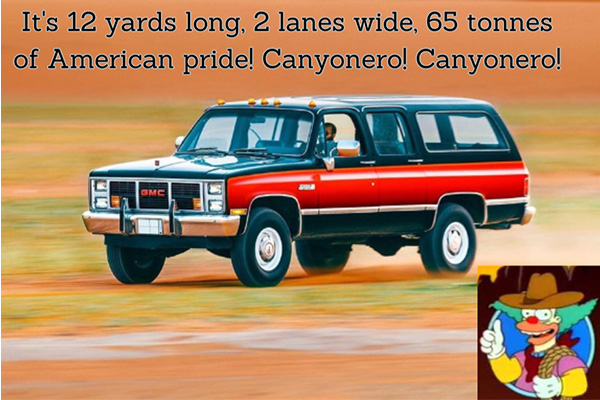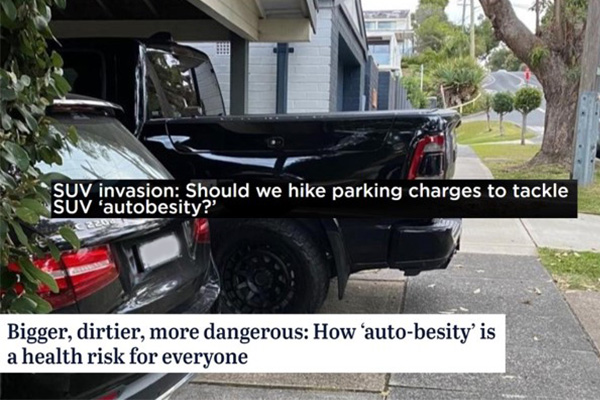The massive cost of autobesity
Lack of emissions standards and generous tax perks make Australia the dumping ground for bloated, inefficient vehicles
Last year 76% of car sales comprised SUVs, utilities and light commercial vehicles - up 45% from the previous decade. According to Peter Mclean, Bicycle NSW CEO, domestic car-bloat presents massive safety and environmental problems:
“Standard utes and 4x4's in Australia are already large enough and not ideal for heavily urbanised areas. This includes Hiluxes, Navaras, Tritons etc,” says Peter Mclean. “But supersized American pick-up trucks are in a whole new category. Because they are (Hiluz vs RAM 1500) 25% heavier, 35% wider, 15% longer and use 54% more fuel.”
CRUNCH! ‘There will never be a bell loud enough, a helmet strong enough or clothing bright enough to make up for weak leadership.’ (Image and text by Tom Flood)
An arms race to the bottom
Apart from emulating the American fashion, drivers claim to feel safe, which may not be the case, due to the roll-factor. And they are completely unsafe for pedestrians, cyclists and other drivers. Car marketers also exploit feelings of personal power and being above other drivers in traffic. But with 4 in 5 cars super-sized, it's a dangerous, congestion-inducing arms race. Everybody loses, especially the environment.
“These vehicles may be practical in regional areas if you need to tow a 4.5 tonne horse float for example. But they shouldn't be used by latte-sipping city slickers dreaming about life as a rancher,” says Peter McLean.
We can’t all be ranchers: Life imitates art with the Canyonero, Yar!! (The Simpsons song)
Putting the social and environmental cost back onto the drivers
Whilst street space is at a premium, the cost of driving behemoths is carried by all of us. Along with deadly car exhaust and CO2 emissions, there are safety and environmental costs. Another concern, especially among councils, is damage to road infrastructure from the increased tonnage. These are all bloat-related expenses which need to be transferred back to the drivers.
“We don’t need to ban oversized vehicles. However, if they’re registered in urban areas then they should be registered as commercial vehicles. Thus providing a disincentive to dominate road space, parking, and often blocking paths”, says Peter McLean.
“This is not just about bicycle riders. But all road users including other small vehicles, pedestrians and people with disabilities are disadvantaged by less road space.”
People are 30% more likely to be killed in collisions with oversized cars
Gargantuan vehicles are deadly weapons. Last year alone, 1194 people were killed on Australian roads - mainly due to bad driving. And larger vehicles increase that risk. This is due to crash forces of speed and mass. Also, higher chassis collisions are more likely to cause head trauma especially involving children or smaller adults. The victims then get run over by tonnes of steel rather than bouncing over the bonnet of a smaller car. Again, children are less likely to be seen due to the oversized front and rear blind spots.
“We really need to have conversations around taxing these massive vehicles because of the road trauma risks.” says Ben Rossiter of Victoria Walks.
Liability must rest with the driver, especially now
Our vulnerability to crash forces is why most European countries now have presumed liability laws. Currently, to claim CTP compensation in NSW, an injured person needs to establish that the motorist was negligent. Presumed liability shifts the burden of proof to the motorist to establish that they were not at fault. This encourages motorists to drive safely and maybe choose sensible cars.
Presumed liable: Collect your latte and a random child in the all-new Tundra (Image: Tom Flood)
Environmental controls might see carzillas go the way of the dinosaurs
Environmental regulations could potentially lead to the decline of oversized vehicles in the near future. Peter McLean suggests that the Federal Government's vehicle emission program may discourage the use of massive cars. Consequently, individuals may reconsider hiring tradespeople with oversized pickups, as the additional costs related to fuel and depreciation could become part of their expenses.
Dominating headlines and street space (Image: Bicycle NSW)
Just one more thing
Not only do we have the best bicycle insurance, but Bicycle NSW has been actively campaigning for 47 years in NSW for better infrastructure for bike riders of all ages and abilities. Join us now and support our campaign for Better Streets.





